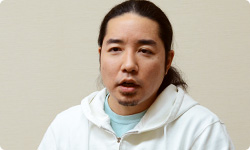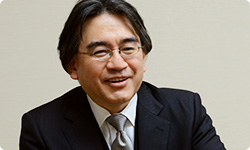2. Theatrhythm is Born
I tend to find there are two types of people working in game development. The first are those who have always been creative - drawing or programming or whatever else, who then make the jump into development and work their way up from there.
Yes.
And then there are those who have been working in completely unrelated areas, but then get into games for some reason, and put what they have learned in those other fields to work for them. I’m definitely the former type, but I get the feeling you’re the latter...
Oh, absolutely. I was always interested in games, and I wasn’t working in too unrelated a field, but it took me a while to make the jump.
There are quite a lot of people who think, “I want to make games, but I don’t have any particularly relevant skills, so I’m not sure how to get started.” I think you’re a great example to those people of how knuckling down and working hard until a path opens up can really pay dividends.
Yes. This conversation reminded me how much respect I have for those who actually create games. At the risk of being misunderstood, I think they’re crazy...
Crazy in a good way, you mean?
Yes. Because in a way, they’re naked and exposed in front of the whole world. The things they like, the things they believe - they’re baring their inner souls to the world, and sometimes people really knock them for that, but they just grin and bear it, and keep on going. It takes real faith to do that. And even among game creators, there are very few who can stand firm and see things through to the very end. So yes, I have a huge amount of respect for them.

So when you made that switch over to the creative side, what was the first project you worked on?
In terms of something that I came up with, THEATRHYTHM FINAL FANTASY is my first.
So this is your debut project as a creator?
Yes. I had worked on projects like Final Fantasy VII Advent Children5, but with Nomura directing, (Takeshi) Nozue6 co-directing, and (Kazushige) Nojima7 writing the script. Mine was really more of a supporting role. 5 Final Fantasy VII: Advent Children was a feature-length CGI movie sequel to Final Fantasy VII, released in Japan in September 2005. 6 Takeshi Nozue is a game creator for Square Enix, and co-director of Final Fantasy VII Advent Children. He has overseen creation of all the movies in the Final Fantasy series since Final Fantasy IX. 7 Kazushige Nojima is a game scenario writer. Despite having left Square Enix, he continues to work with them on the Final Fantasy series through his company Stellavista.
How did you feel, and how did you see your role, working with all of those game creators who you respect so much?
To put it slightly grandly, I saw my role as not only to make the end consumer happy, but to make those who were making the game happy as well.
You mean, to allow them to feel that they had done a good job, so that they could move on to whatever they were working on next?
Exactly. But in the end, the opposite happened with Advent Children.
How do you mean?
Well, people told me this afterwards, but apparently, for the two weeks leading up to launch, I seemed nervous. I suppose I was frustrated, because although there was nothing left for me to do, I felt that I should be doing something. And Nomura, Nozue and everyone else kept saying, “It’ll be fine! It’ll sell!” (laughs) Of course, that’s what I should have been telling them!
You ending up being supported by the people you saw it as your job to support?
Yes! I think I was probably pretty scared - it was the first time I’d ever been in that position.
But it feels like you were able to channel the huge respect and admiration you had for these creative people, and use it to help you. Hearing you talk about your experiences makes me realise at least part of where THEATRHYTHM FINAL FANTASY must have come from.
Yes, maybe you’re right. There’s probably a connection.
I’m sure there is. I mean, I think only someone who truly understood the ability of the music and visuals of the FF series to move people, and who had a deep understanding of, and respect for, the people who created them would have been able to bring a project like this to fruition.
I first proposed the project when we had just finished Advent Children, actually.
So you could say that your experience of working on a project that highlighted the importance of the sound and cinematics of the FF series led directly to the creation of THEATRHYTHM FINAL FANTASY?
Yes, I suppose you could. I originally planned to make it for Nintendo DS, but so many compromises needed to be made in terms of storage capacity and what we could do in terms of presentation that it never got beyond the planning stages. So when I saw Nintendo 3DS, my first thought was, “Yes! Now we can do it!”
Is that right? (laughs)
I went straight to Indies Zero8, the developers, and we came up with a proposal, which we put to Nomura. He got back to us the same day saying, “It sounds interesting, let’s do it,” and we started development from there. 8 Indies Zero is a game production company that was created in 1997, and focused around members of a human resources development project that was set up by Nintendo and Dentsu.
This might be a stupid question, but if you’re making a product that spans the entire FF series, you must have to speak to a lot of important people within and outside the company, other than Nomura-san. (laughs)

Yes, you do! (laughs) We were actually lucky enough to have the creators of all those legendary titles play the game themselves.
Ah, that was the “They Played it!” 9 video, wasn’t it? 9 “They Played it!” was a promotional video presented at the Nintendo 3DS Conference 2011. It showed the “fathers” of the Final Fantasy series, including Hiromichi Tanaka, Akitoshi Kawazu and Yoshinori Kitase, playing Theatrhythm.
Yes. Obviously, we had already cleared everything with them, but that really felt like the final seal of approval.
I did something similar when I worked on Super Smash Bros.10, so I know exactly how you must have felt. (laughs) 10 Super Smash Bros. is a multiplayer fighting action game that was released for the Nintendo 64 in 1999.
(both laugh)
Really!?
But it was a risky business! (laughs) I had to think very carefully before doing it - it meant calling in every favour I’d ever saved up!
I’m sure! But I have to admit, I didn’t speak to (Hironobu) Sakaguchi11 or (Nobuo) Uematsu12 myself. We sent an email to Mr. Uematsu to inform him of our plan, but we never actually spoke to him. 11 Hironobu Sakaguchi is the creator of the original Final Fantasy. He left Square Enix in 2001 to form his own company, Mistwalker. 12 Nobuo Uematsu is the composer of the music for Final Fantasy and many other RPGs.
But I’m sure if you let Uematsu-san know how much respect you give to the music in this title, he would have said yes, wouldn’t he? I’d be curious to know about the reactions from these “fathers” of the series which were not shown in the video.
I think they have a very parental attitude towards the series, and I hope I’m not mistaken in saying that they would be supportive of what we’re doing.
I’m sure they all love it! (laughs) And I’m sure your respect and admiration for the series shines through, and that they trust you to treat their baby with care.
...I hope so. That would make me very happy. Our main aim was to make something pleasing for everyone. I’m personally extremely pleased with it.